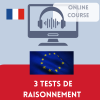Since the reform of EPSO competitions in 2023, most external competitions are now held over a single day.
Whether generalist or specialist, all competitions include the following components:
- Three reasoning tests (verbal, numerical, and abstract)
- A multiple-choice knowledge test (focused on the field of the competition or, for generalist competitions, on the European Union)
- A written test
The three reasoning tests and the written exam are therefore common to all external EU competitions.
The Three Reasoning Tests
These tests assess your logical thinking skills across three areas:
- Verbal reasoning: your skill in deciding if a statement is true based on the information in the text.
- Numerical reasoning: your ability to analyse numerical data and use it to find the correct answer.
- Abstract reasoning: your ability to recognise patterns and logical relationships between sequences of shapes in diagrams.
Everyone can improve these skills with a structured and consistent preparation.
A solid methodology is essential to understand the logic behind each test and to develop the right strategies before practicing under time pressure.
Our books and online courses guide you step by step in mastering these techniques.
Once you have internalised the strategies, practice under real test conditions (timer, calculator, notepad, etc.).
Our online tests allow you to assess your progress, analyse your mistakes, and improve with detailed explanations.
The Written Test
The written test usually takes place on the same day as the reasoning tests, so it’s important to prepare for it in parallel.
To succeed in this part, you should:
- understand the assessment criteria;
- become familiar with the different types of documents that may be required (summary, press article, briefing note, speech, etc.);
- learn how to prepare the reference document provided before the exam;
- develop your writing skills to produce clear, concise, and well-structured content.
Our online course gives you all the tools you need to prepare effectively for this exam.
In Summary
To maximize your chances of success in EU competitions, start your preparation as early as possible.
Success relies on three key pillars:
- a solid understanding of the tests,
- mastery of effective methods,
- and regular practice under realistic conditions.
With time, method, and focused training, you can achieve your goals and succeed in the European Union competitions.






